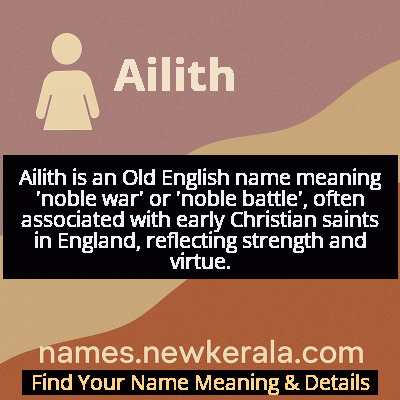Ailith Name Meaning & Details
Origin, Popularity, Numerology Analysis & Name Meaning of Ailith
Discover the origin, meaning, and cultural significance of the name AILITH. Delve into its historical roots and explore the lasting impact it has had on communities and traditions.
Name
Ailith
Gender
Female
Origin
Christian
Lucky Number
5
Meaning of the Name - Ailith
Ailith is an Old English name meaning 'noble war' or 'noble battle', often associated with early Christian saints in England, reflecting strength and virtue.
Ailith - Complete Numerology Analysis
Your Numerology Number
Based on Pythagorean Numerology System
Ruling Planet
Mercury
Positive Nature
Adventurous, dynamic, curious, and social.
Negative Traits
Restless, impatient, inconsistent, prone to indulgence.
Lucky Colours
Green, white.
Lucky Days
Wednesday.
Lucky Stones
Emerald.
Harmony Numbers
1, 3, 9.
Best Suited Professions
Sales, marketing, travel, entertainment.
What People Like About You
Versatility, charisma, adventurous spirit.
Famous People Named Ailith
Saint Ailith
Religious Figure
Anglo-Saxon abbess and saint known for establishing religious communities in Northumbria
Ailith of Mercia
Noblewoman
Mercian noblewoman who founded several charitable institutions and was known for her patronage of religious arts
Ailith Fletcher
Historian
British medieval historian specializing in Anglo-Saxon women's roles in warrior societies
Ailith MacGregor
Educator
Scottish educator who established one of the first schools for girls in the Highlands
Name Variations & International Equivalents
Click on blue names to explore their detailed meanings. Gray names with will be available soon.
Cultural & Historical Significance
The name's persistence through centuries of linguistic and cultural change demonstrates its deep resonance in English identity. Unlike many Old English names that disappeared after the Norman Conquest, Ailith and its variants survived in regional usage, particularly in northern England where Anglo-Saxon traditions remained stronger. In medieval literature and religious texts, women named Ailith were often portrayed as models of virtuous strength - combining feminine grace with moral fortitude. This dual aspect made the name particularly appealing during the Victorian era's romanticization of medieval history, and it has experienced renewed interest in recent decades as part of the movement toward strong, historically grounded feminine names that celebrate women's agency and capability throughout history.
Extended Personality Analysis
The name Ailith typically evokes personality traits that beautifully balance strength with sensitivity, reflecting its 'seasoned warrior' meaning. Those bearing this name often exhibit remarkable emotional resilience and the ability to recover quickly from setbacks, combined with a thoughtful, analytical approach to problem-solving. They tend to be natural protectors who instinctively shield others from harm, whether physical or emotional, while maintaining a calm, centered presence even in challenging circumstances. Their 'seasoned' quality manifests as wisdom beyond their years and the ability to learn valuable lessons from every experience.
Ailiths generally possess strong intuitive abilities and deep empathy, allowing them to understand others' perspectives and needs with unusual clarity. They are often drawn to roles that involve guidance, teaching, or healing, where their combination of strength and compassion can benefit others. While they can be fiercely determined when pursuing important goals, they typically prefer diplomatic solutions to conflicts and excel at finding common ground between opposing parties. Their leadership style tends to be collaborative rather than authoritarian, inspiring loyalty through genuine care and consistent integrity. Many Ailiths develop a strong sense of personal ethics early in life and remain committed to their principles throughout various life challenges, earning respect for their unwavering character and reliable judgment in both personal and professional relationships.
Modern Usage & Popularity
In contemporary naming practices, Ailith represents a growing preference for historically significant names that combine unique sounds with powerful meanings. While still considered uncommon, its usage has shown consistent growth since the late 20th century, particularly among parents with interests in medieval history, English heritage, or strong feminine names. The name currently enjoys moderate popularity in the United Kingdom, where it ranks around the 800-900 position, with slightly lower usage in the United States, Canada, and Australia. Modern Ailiths often appreciate their name's distinctive quality and the conversations it sparks about its historical origins and meaning. The name's appeal crosses educational and cultural boundaries, attracting both traditionalists who value its ancient roots and modern parents seeking names that empower their daughters with connotations of strength and resilience. Social media platforms and online genealogy resources have significantly contributed to Ailith's renewed visibility, connecting modern bearers with the name's rich historical legacy and creating communities around shared naming heritage.
Symbolic & Spiritual Meanings
Symbolically, Ailith represents the powerful concept of transformative strength - the ability to harness inner resources to overcome challenges and emerge wiser and more capable. The warrior aspect symbolizes not aggression but the courage to face life's battles with integrity and purpose, while the 'seasoned' quality represents wisdom gained through experience and reflection. This combination creates a rich symbolic tapestry of resilience, growth, and ethical fortitude. In psychological terms, Ailith embodies the archetype of the spiritual warrior who battles inner demons and external obstacles through principles rather than force.
Metaphorically, the name suggests a journey of continuous self-improvement and the development of character through facing adversity. It represents the idea that true strength includes vulnerability, compassion, and the wisdom to know when to stand firm and when to yield. In contemporary symbolic interpretations, Ailith often appears in discussions about feminine power that combines traditional nurturing qualities with modern assertiveness and capability. The name also carries connotations of protection and guardianship - not just of people, but of values, traditions, and principles worth preserving. In spiritual contexts, Ailith symbolizes the soul's journey toward enlightenment, battling ignorance and attachment while developing virtues like patience, compassion, and discernment through life's varied experiences.

